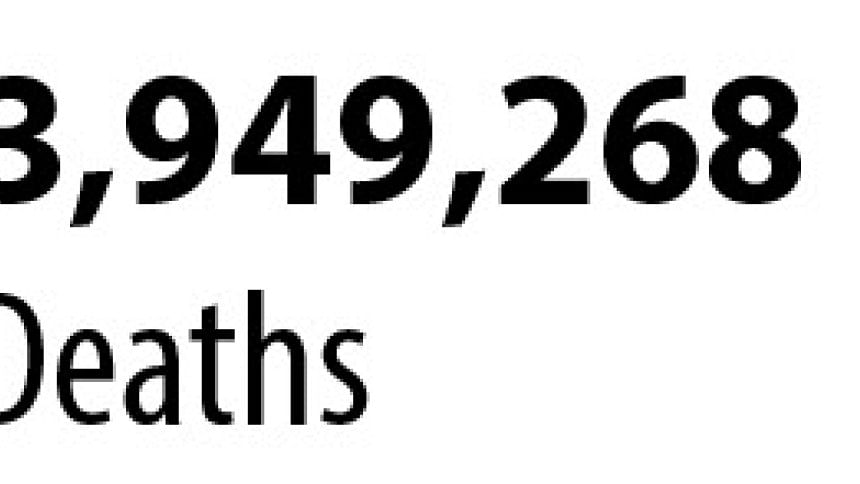World passes 3b vaccine mark
More than three billion doses of Covid-19 vaccines have been given across the world, an AFP tally from official sources revealed yesterday, as the highly infectious Delta strain continued to cause mayhem around the world.
Russia reported its highest daily coronavirus death toll and Australia locked down major cities.
The pace of vaccination has so quickened that while it took 20 weeks to give the first billion, it only took four to give the last one thousand million. Some four of 10 of the jabs have been given in China (1.2 billion), with India (329 million) and the United States (324 million) also in the top three.
But it is a trio of Middle Eastern countries that leads the way in terms of coverage, with the United Arab Emirates having given 153 doses per 100 people, ahead of Bahrain and Israel on 124.
The three have nearly fully vaccinated 60 percent of their inhabitants.
Following them are Chile (118 doses per 100 people), the United Kingdom (113), Mongolia (111), Uruguay (110), Hungary (107), Qatar (107) and the US (98).
These countries have fully vaccinated around half of their populations (between 46 and 54 percent).
The European Union has given 357 millions shots to half of its population, with some 32 percent of the population having been fully covered.
But globally the vaccination drive is still hugely unequal even if most poor countries have begun to vaccinate thanks to the Covax sharing scheme run by the World Health Organization, Gavi and the Cepi coalition.
According to the AFP count, high-income countries as defined by the World Bank have administered an average of 79 doses per 100 inhabitants.
In low-income nations, the figure is just one shot per 100 people. And five countries have yet to start their campaigns -- Tanzania, Burundi, Eritrea, Haiti and North Korea.
Despite the controversies around it, the Oxford/AstraZeneca jab is still the most used in the world, given in eight of 10 countries. Then comes the Pfizer/BioNTech jab (used in 102 or 47 percent of countries that have started vaccinating), with Sinopharm and Moderna used in at least 48 countries, Russia's Sputnik V (at least 41), Johnson & Johnson (31) and Sinovac in 24.
On the ground, Russia yesterday reported its highest daily coronavirus death toll and Australia locked down major cities.
At least 3.9 million people have died from Covid-19 and the pattern of vaccinations globally is highly uneven.
Russia reported 652 coronavirus fatalities over the past 24 hours, with a record-high number of daily deaths -- 119 -- in Saint Petersburg, which is due to host a Euro 2020 quarter final on Friday.
Health Minister Mikhail Murashko said 151,000 people in Russia are currently in hospital with the coronavirus.
In further bad news, Kremlin spokesman Dmitry Peskov admitted that Moscow's goal of vaccinating 60 percent of the population by the end of summer was unattainable.
Meanwhile, foreign ministers from the Group of 20 major economies stressed the need for greater global cooperation.
"Multilateral cooperation will be key to our collective ability to stop this global health crisis," US Secretary of State Antony Blinken said.
Chinese Foreign Minister Wang Yi did not name the United States but suggested ulterior motives in the rhetoric as he called on the G20 to show "true multilateralism".
"China calls on able countries to avoid export restrictions or excessive hoarding" of vaccines, Wang said.
Western leaders have pledged to donate one billion doses to poorer countries.
In Australia, public anger is growing at the slow pace of vaccinations. The Delta variant has pushed Sydney, Perth, Darwin and Brisbane into lockdown, meaning a total of more than 10 million Australians are confined at home.
But so far, less than five percent of adults are believed to have received both vaccine doses.
The Delta variant was first identified in India, which suffered a vicious wave of coronavirus that overwhelmed hospitals and crematoriums at its height in April and May.
India yesterday authorised the emergency use of Moderna's Covid-19 vaccine as it seeks to ramp up inoculations. It is the fourth to be approved by New Delhi after Oxford-AstraZeneca's Covishield, Covaxin -- developed by Indian firm Bharat Biotech -- and Russia's Sputnik V.


 For all latest news, follow The Daily Star's Google News channel.
For all latest news, follow The Daily Star's Google News channel. 



Comments